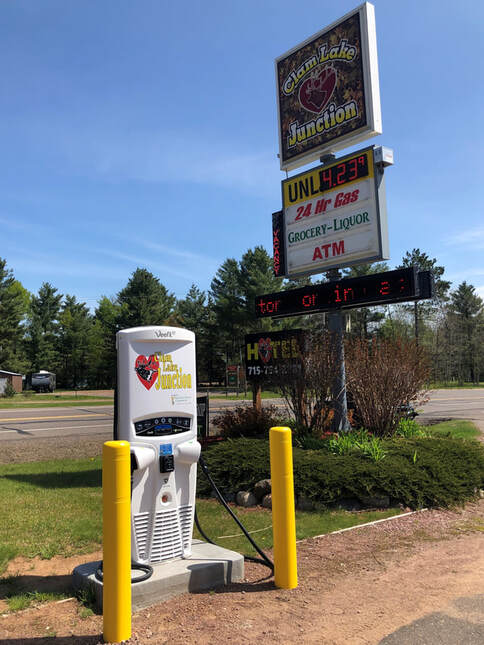Home » Community Development » Ashland County Charges Ahead- Electric Vehicle Planning Workgroup
Ashland County Charges Ahead- Electric Vehicle Planning Workgroup
The University of Wisconsin Extension – Ashland County and Cheq Bay Renewables are hosting an EV planning workgroup to facilitate electric vehicle infrastructure in Ashland County. A series of 10 monthly meetings will set the stage for implementation in 2024/2025.
The workgroup is comprised of area elected officials, state resource personnel, educational institutions, Bad River tribal officials, local businesses, and interested community members. The meetings started in April 2023 and will run through December 2023. Each meeting has a keynote speaker and focus area relating to electric vehicles or electric vehicle charging infrastructure. Monthly topics are listed below with links to the recorded keynote speakers.
Meeting 1
April 18, 2023
Keynote Speaker: Matt Christman of Wisconsin Clean Cities: “Setting the Stage for a New EV Economy”
Meeting 2
May 16, 2023
Keynote Speaker: Tim Bartels of Xcel Energy: “Partnering with Communities and Customers on EV Charging”
Meeting 3
June 20, 2023
Keynote Speaker: Bill Bailey of Cheq Bay Renewables “Funding Opportunities for EV Infrastructure”
Meeting 4
July 18, 2023
Keynote Speaker: Bill Bailey of Cheq Bay Renewables “Preparations for Funding Applications”
Meeting 5
August 15, 2023
“Vehicles: Criteria and Availability”, Keynote Speakers: Bradlee Fons, Co-founder, Drive Smart Wisconsin and Chief Joel Trepczyk, Somerset Police Department.
Meeting 6
September 19, 2023
“Purchasing Vehicles”, Keynote Speaker: Jeremiah Brockman, President, Wisconsin Chapter of Electric Vehicle Association.
Meeting 7
October 17, 2023
Education: “What’s Needed to Inform Our Communities”
Meeting 8
December 5, 2023
“What’s Next? Emerging Issues, Celebrate”
Meeting 9
January 16, 2024
Final Outreach Plan and Celebration
The group's goals are to:
- Develop a map/list with current electric charging stations, and add our public, private, short- and long-term priority locations for the future.
- Determine what grants are available to pay for charging stations and infrastructure: Can we apply collaboratively, when?
- Determine what kinds of vehicles are available for different uses, and whether a group vehicle purchase is possible or needed.
- Develop an outreach campaign for county partners to use in 2024.

Resources to Learn More!
- Cheq Bay Renewables, serving Ashland and Bayfield Counties
- A 501(c)(3) nonprofit organization working to make renewable energy more accessible in Ashland and Bayfield counties. Cheq Bay Renewables co-hosted the Ashland County Charges Ahead work group with our Extension office in 2023.
- More on local electric vehicle activities and programs here.
- Wisconsin Clean Cities
- Established in 1994, Wisconsin Clean Cities is one of the U.S. Department of Energy’s more than 75 Clean Cities coalitions. The organizations support the nation’s energy and economic security by building partnerships to advance affordable domestic transportation fuels, energy efficient mobility systems and other fuel-saving technologies and practices.
- Wisconsin Clean Cities leads the Drive Electric Wisconsin project. The project is part of DRIVE Electric USA, a partnership of U.S. Department of Energy Clean Cities coalitions working to significantly advance electric vehicle (EV) adoption in their states.
- Wisconsin EV Association
- The Electric Vehicle Association (EVA) is a non-profit organization that works to accelerate the adoption of EVs in the United States and Canada through outreach, action, and education. There is a robust chapter in Wisconsin.
- https://www.myeva.org/wisconsineva
- Xcel Energy Electric Vehicle User Guide
- Compare the cost of your selection to a similar gas vehicle. An electric car can save you money because it can be less expensive to own and maintain than a 100% gasoline-powered car.
- https://ev.xcelenergy.com/
- Midwest Renewable Energy Association (MREA)
- Promoting clean energy, energy efficiency, and sustainable living through education and demonstration since 1990 in Custer, Wisconsin.
- Download a factsheet on the utility of EVs
- University of Wisconsin Research Center: Energy on Wisconsin
- Energy on Wisconsin engages communities, tribes, businesses and organizations to advance Wisconsin’s transformation to a clean energy economy for the health, prosperity and resilience of all its people and future generations.
- A case study about Bayfield County’s EV and solar installatio
HAVE A QUESTION?

Lissa Radke serves Ashland County as the Community Development Educator. To learn more about Community Development Programming and the role of Extension in Ashland County, send an email to lissa.radke@wisc.edu or call the Ashland County office at 715-682-7017.




